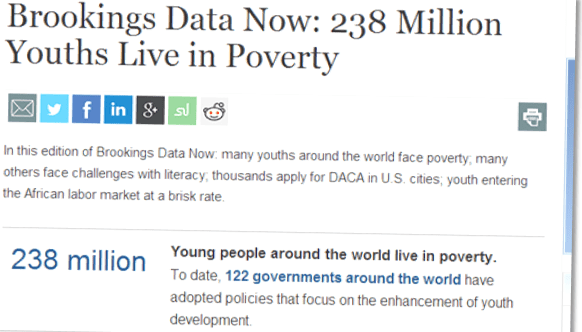In this edition of Brookings Data Now: one of the least productive Congresses; Haitian families still displaced four years after earthquake; minimum wage lower (effectively) than in 1964; lower education rate for lowest income Americans; how to reduce the poverty rate in America.
Number of bills introduced in 113th Congress that became lawOf over 5,700 bills introduced in both chambers of Congress together during the 113th Congress, only 56 became law, one of the least productive sessions of Congress since 1947. |
|
|
|
Four years after Haiti earthquake, percent of uprooted families who still consider themselves displacedThese families were surveyed and gave this response even though they do not live in camps. At the end of 2013, 146,573 IDPs were still living in 271 camps in Haiti. |
| $2.15 |
The inflation-adjusted federal minimum wage of $7.25/hour is effectively $2.15 lower than it was in 1964.One in four workers living in suburbs work in low-wage occupations. |
| 11% |
Percent of people with a post-secondary degree in the bottom income quintile56 percent of people in the top income quintile have a post-secondary degree, and 29 percent of those in the middle income quintile do. |
| 8% |
Decline in Poverty Rates Among Single Parent Families Under New Poverty & Inequality ProposalIn a new proposal from the Center on Children and Families, Isabel Sawhill and Quentin Karpilow outline five policies that would reduce the poverty rate across the board. |
Mingwei Ma contributed to this post.
The Brookings Institution is committed to quality, independence, and impact.
We are supported by a diverse array of funders. In line with our values and policies, each Brookings publication represents the sole views of its author(s).


Commentary
Brookings Data Now: < 1% of Bills Became Law in 113th Congress
January 16, 2014